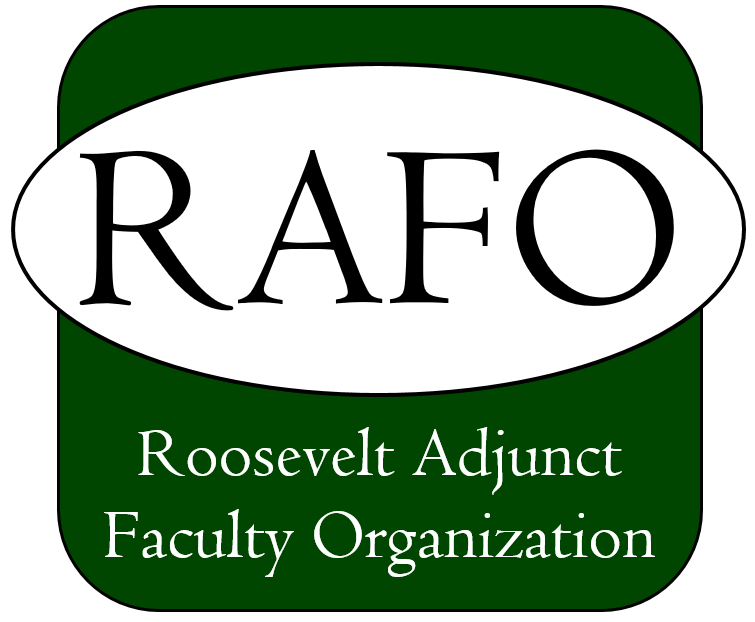Fellow Adjuncts,
Welcome back to Roosevelt and the 2017-2018 school year.
Roosevelt’s restructuring continues apace, and there is no more visible symbol of the change than the fact that the adjunct office in the Chicago campus is now located in room 254. This is the office for all adjuncts, from those who have taught in the Auditorium Theatre building to those that taught exclusively at the Gage Building. All classes are now in the Auditorium building or the Wabash tower – and all adjuncts are now going to be in 254.
So is RAFO.
Our office has been relocated to room 254A – at the east end of 254. This gives RAFO an opportunity to hear from more of you as directly as we can, and for all of us to work together in ways that can help each other through the changes at Roosevelt. At the same time, it allows us to both show the RU community why adjuncts are such an integral part of the school and for us to demand that respect to adjuncts is both deserved and earned by all of us.
Our membership meeting is September 7 from 1-6 p.m. in AUD 825, and we are asking all adjuncts who are full members of the RAFO bargaining unit to cast ballots on the tentative contract agreement which RAFO reached with the administration this past July. We are also asking that ALL adjuncts become full voting members of RAFO so that you can participate in union decision-making (such as contract ratification) and help build new leadership and directions for the union, all while monitoring the university as the work to stabilize and eventually grow RU continues.
Roosevelt promotes a mission of social justice. RAFO truly works to make that mission real for all adjuncts, and for RU and in academia writ large. Higher education continues to be under stress in this country, and schools like Roosevelt serve as important entries for the students it works to graduate. Adjuncts are just as essential, and RAFO is here to make sure that we continue to be recognized.
So when you come to the adjunct office, knock on our door and say hi. We need to hear from you as the school year begins and throughout the year.
Welcome back.
In solidarity,
The Executive Committee
Roosevelt Adjunct Faculty Organization
Illinois Education Association/National Education Association
We have a Union Contract.
RAFO and the 2017/2018 Contract Team completed the contract negotiations on behalf of the RAFO Executive Committee and all of the Unit Bargaining Members. Here is a list of the most crucial advancements in our working conditions.
- Article 1 - Expanded the time it takes for a Union Member to fall out of the unit to three full years. This means that if an adjunct faculty member does not teach for one or two years straight, they can still return to RU at the same pay rate when they last taught a course.
- Article 2 - RAFO will be able to have two Senators from each college represent the adjunct faculty. We have increased our representation by 50% over the last two contracts giving the union a bigger voice within the university.
- Article 3 - RAFO increased the amount of funding for Professional Development by 9%. The Executive Committee will approve additional grant opportunities and reimburse representation on the various union committees.
- Article 4 - RAFO moved forward the deadline for Fall course assignments by 30 days. The new deadline for Fall course assignment notification is now May 31 instead of June 30.
- Article 4 - RAFO eliminated the condition that adjunct faculty members teach within the previous two terms to receive a six hour course load.
- Article 4 - Adjunct faculty members may take a one year leave every five years without any impact to their standing in the university or on the pay scale.
- Article 7 - RAFO increased the Mandatory Duties rate to $49 per hour. Also, we added that the university make every effort to provide mandatory duties, such as a department meeting, by video conference mode.
- Article 7 - Tuition Remission has increased up to 50% for all adjunct faculty, their spouses or partners, and their children.
- Article 7 - The class cancellation fee for Step 3 and 4 adjuncts increased from 20% to 22%.
- RAFO and Roosevelt University agreed on a “me too” clause to determine any pay raises for the duration of the 2017-2020 contract. If any faculty receives a raise in any amount, then RAFO members will receive a raise in the same percentage amount. This will augment the salary scale and become a permanent increase within the contract.
I attended the National Education Association’s Representative Assembly in Boston from June 29-July 6 as RAFO’s elected delegate. I enjoy attending the NEA RA because it allows me to become involved in the NEA’s national platform and make my voice heard. If you would like information on everything that happened and was discussed in the floor at the NEA RA, you can check out the 2017 NEA RA website here: https://ra.nea.org/. You’ll find the menu called “Business Items” of significance.
When I attend the RA, I participate in a few of the caucuses—the Women’s Caucus, the LGBT Caucus, and the National Council for Higher Education caucus. Specifically, today, I’d like to talk about the National Council for Higher Education (NCHE) and ask you to consider getting involved. I’m not asking you to become involved in NCHE out of the goodness of your heart—I’m asking because I’m alarmed and worried about the future of federal and state funding for Roosevelt University and our students.
At the RA this year, NCHE voted to support motions urging the NEA to move against federal or state funding for private colleges and universities. As Roosevelt is a private university and both the university and our students suffered because of the MAP Grant fiasco, it’s important that we fight to allow our students to continue to use federal or state funding at our school. Oscar Valdez, our Region 67 Vice Chair and member of US of CC (at Columbia College Chicago—also a private college), approached the maker of the items to help him revise the language, so it would protect NEA members like us, who work at private colleges and universities. The maker declined Oscar's offer. We agree that students need protection from predatory colleges or universities; however, the language in the motions did not make a distinction--a private, non-profit, accredited university like Roosevelt is not the same thing as a for-profit school like ITT Technical Institute.
The items in question were Policy Statement C-2 (defeated) and NBI 106 (amended & passed). I spoke on the RA floor about these items for several reasons:
- The language in the items was vague. What funds are in question? Is the motion writer referring to federal student loans, federal grants, scholarships, tuition remission offered by public employers? Students shouldn’t be prevented from getting federal assistance because they chose a private college or university.
- The writers, in their original text, were equating private colleges and universities with charter schools. This was done to evoke emotion in K-12 NEA members because charter schools are often a topic for debate. Higher education funding is much different from K-12 funding.
- The speakers on the floor cherry picked specific examples of online universities with questionable business practices to bolster their arguments. Many private colleges and universities, like Roosevelt, do not have business practices like the examples they used. Many of Roosevelt’s courses are taught by adjunct faculty who are union members, not “graders.”
- Not all higher education institutions are the same. NBI 106 (as amended) has asked the NEA to “identify states that use state funds to subsidize tuition or otherwise underwrite private colleges and universities for courses and/or degree programs that substantially duplicate offerings by that state’s public colleges and universities.” Students choose the colleges or universities they attend based on the school’s reputation and fit for the student’s life and career goals. In additions, some students choose schools because they want to work with a specific professor at that school.
- Finally, NEA has members (like RAFO and US of CC) who work at private colleges and universities. This will hurt our enrollment and impact our jobs.
After speaking on the floor against Policy Statement C-2 and NBI 106, many K-12 RA attendees approached me to thank me for speaking because they don’t understand the ways that higher education operates differently than K-12. Based on the original language in the motions, I feel that the writer of the motions does not understand the differences in funding, either. So, in Roosevelt’s interest and that of our students, here is what I ask you to do: get involved. You can start by joining the National Council for Higher Education. As NEA members at a private university, we need to make our voices heard. You can also join the Illinois Education Association’s Higher Education Council or follow them on Facebook.
The Search Committee for a Director of the Academic Success Center invites the Roosevelt community to attend presentations with three finalists on Monday, July 17, Tuesday, July 18, and Monday, July 24. The candidates will give a 30-minute presentation followed by a 15-20 minute question and answer period.
The presentations will be held on the Chicago Campus in AUD 309, and will be broadcast to the Schaumburg Campus in Room 311. If you are unable to attend, please feel free to connect via Zoom.
The finalists candidates presenting are:
- Jenna Cler, Monday on Monday, July 17 from11 a.m. to noon in AUD 309/SCH 311 and Zoom roosevelt.zoom.us/j/758351257.
- Chicha Sanders onTuesday, July 18, from 1 p.m. to 2 p.m. in AUD 309/SCH 311 and Zoom roosevelt.zoom.us/j/867130380.
- Adam Wouk on Monday, July 24 from 11 to noon in AUD 309/SCH 311 and Zoom roosevelt.zoom.us/j/241968497.
Your feedback for each candidate is critical in determining which applicant will serve in this role and continue to push Roosevelt toward creating an engaging campus life for all students.
Feedback forms and candidate materials will be provided at the time of each presentation. For questions, contact Mary Grigar, ASC Director Committee Search Chair.

My name is Beverly Stewart. I am a founding member of the Roosevelt Adjunct Faculty Organization (RAFO), which formed in 2000. I served as president for six years and in other capacities since.
On a state level, I was elected in 2002 to the higher education council, a body of ten people who represent higher education concerns to the Illinois Education Association (IEA) – which has 130,000 of mostly k-12 teachers. I am now its chair, representing about 6000 higher education members in the IEA. About a third of those members are contingent academics.
I share these details to introduce myself and to provide my reason for embarking on writing a monthly blog for the RAFO web page. In my monthly communications, I plan to tell you about what we are doing as a higher education council and hope to inspire you to consider becoming involved in actions or in planning them.
Plans for the State
On Saturday, June 3, the higher education council decided at its retreat to embark on campaign to educate all IEA members about the economic cost not funding higher education has on Illinois as a state. For example, every dollar not spent on higher education equates to a loss of $2.29 to the state economy. Learn more by reading the Center for Tax and Budget Accountability report: “Illinois’ Significant Disinvestment in Higher Education."
Summer Actions
We are also working with the Fund Our Future Coalition to educate the wider community. We have several actions:
- June 21 Northeastern Illinois University Day of Action – going to Winnetka to Rauner’s house is an included activity (180 employees are slated for layoff at NEIU because of the lack of state funding and no budget)
- June 26, 27, 28, 29 call on legislators to pass a budget that fully funds higher education. (Each day will include a different message.) March for Public Education with an emphasis on higher education, set for Saturday July 22.
- July 29 canvass of friendly voters to share with them about the funding crisis
 Summer Training
Summer Training
The Illinois Education Association’s Summer Leadership Academy is hosting a training on building a solid and strategic contract campaign. We invite individuals and local team members to work together on a contract campaign strategy to help win on some sticky contract issues. The workshop starts Thursday July 27 and ends Friday July 28 at noon. Register a team today! Our session is in the bargaining school session.
I will be sending a link to all members that offers an opportunity for involvement in many capacities. Changing our current reality is up to us. Stay tuned!
In Solidarity,
Beverly Stewart
IEA Higher Education Council Chair
Subcategories
Contracts
RAFO Members:
As lead negotiator for the 2020-2024 contract, I am pleased to announce that your negotiating team and Roosevelt University have come to an agreement. RAFO is extremely pleased with the final outcome and we believe you will be, too. The University was adamant on 0% for the first year, but as an offset for that 0%, we negotiated a signing bonus of $150 for each bargaining unit member that taught either in Spring 2020 or will teach in the upcoming Fall 2020 semester. That then takes us into the final three years of the contract where adjuncts will receive a 2% increase for each of those years.
As I hope you can see from the above, RAFO worked hard to ensure that you are rewarded for the professionalism and integrity all have shown during these unusual and trying times. We are attaching a copy of the final contract for you to review and eventually ratify. The areas that appear in green are changes that were made to the verbiage in the contract that will support RAFO during the upcoming 4 years. Appendix A reflects the 2% increase for each step in the final three years.
A link with the time will be sent next week for all to join this a zoom meeting, where we can answer your questions about the contract.
In closing, we hope you will be as excited as we are regarding the new contract.
In solidarity,
Don Wlodarski and the RAFO team:
Jen Wilson, Joseph Fedorko, Amelia Hicks, Stan Traywick, Mike Pinsoff and Dennis Tucker
Page 29 of 32

